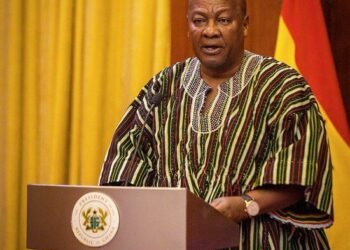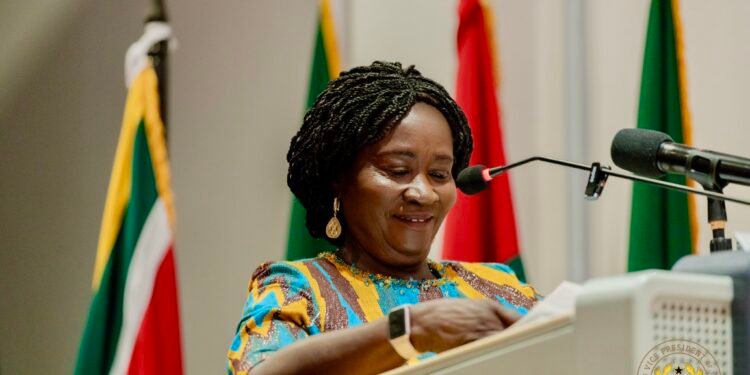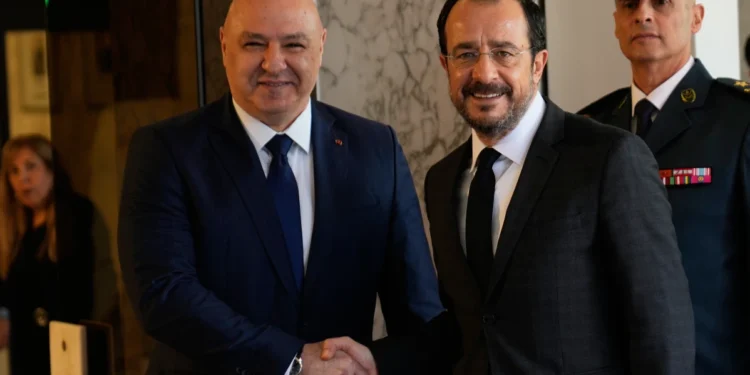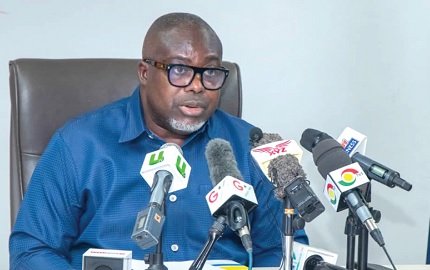Vice President Prof. Naana Jane Opoku-Agyemang has reaffirmed government’s determination to reduce the export of raw materials in favour of domestic value-added processing, insisting that the shift is essential for employment creation and for reducing the pressures that drive irregular migration.
Speaking during her meeting with the Ghanaian Community Association in Luanda, on the sidelines of the 7th AU–EU Summit, she reflected on Ghana’s natural advantages, noting that “there’s hardly anything that doesn’t grow in the tropics.” She argued that this natural abundance must translate into stronger internal production systems that support national development.
“Ensuring that we are putting a halt, if not a big, big break on the exportation of raw materials” is central to government thinking, Prof.Opoku-Agyemang pointed out in her remarks, emphasising that halting the long-standing dependence on raw exports is a national priority.
“We are trying to find ways in which we can process raw materials because that is where we get a lot of wealth – that is where the value rises. If it’s all about exporting, then we are not going to get a lot of benefits”
Vice President Prof. Naana Jane Opoku-Agyemang
She explained that the wealth generated through processing remains within the country, yielding jobs and strengthening local industries – benefits that are lost when the nation exports unprocessed goods.

She stressed this by pointing to the cocoa sector as an example of unrealised potential. “Imagine if we were to process the cocoa and add value, how many more jobs we would have created,” she added.
Migration Pressures and Economic Reform
The Vice President’s concern over migration, particularly the dangers associated with irregular travel, formed a major part of her message, describing the tragedies involving young Africans attempting to cross the Mediterranean in search of opportunities that should exist at home.
“They are falling into the Mediterranean, trying to cross to get jobs,” she lamented. According to her, Ghana cannot accept a situation where its youth feel forced to flee limited prospects, adding that migration should be a choice rather than a desperate escape for survival.
The Vice President highlighted that creating sustainable jobs is the most reliable way to address the structural drivers of migration.
She noted to the Ghanaian Community Association in Luanda that the government back home is reviewing policies from the past that have not supported long-term national growth. Her message was clear: a stronger production-based economy will anchor young people at home and open new avenues for investment and partnership.
“We want people to migrate because they want to, not because they are being pushed out,” the Vice President said – her call for partnerships underlining the government’s openness to collaborative investment arrangements that support processing industries.

She encouraged Ghanaians abroad to take interest in these areas, noting that every country benefits when its citizens contribute to sectors that generate jobs and technological advancement.
Registration, Identification and National Belonging
Prof. Opoku-Agyemang also urged Ghanaians living in Angola to register with the Ghana Embassy, stressing that emergency communication and accountability depend on up-to-date records.
“We don’t want to be in a situation where we don’t know where our people are,” she said, warning against situations where authorities cannot locate citizens during crises. Her appeal was direct and practical.
She assured community members that Ghana Card services would be provided to them soon as the identification system remains central to national organisation.
“We have heard you regarding the Ghana Card – and we’ll do what we need to do to ensure that you get them soon,” she added, emphasising that the card is recognised as a primary form of identification, even for Ghanaians living abroad.
The Vice President noted that every country must make progress by acknowledging challenges while focusing on forward movement and charged Ghanaians in Angola to contribute their best to the nation’s development even as they do so for Ghana.

Her message to the community captured this outlook succinctly as her closing point reinforced the responsibility shared by Ghanaians at home and abroad.
READ ALSO: Mobile Money Storms to GHS 434.7bn in Monthly Transactions — Ghana Sets New Digital Finance Record























